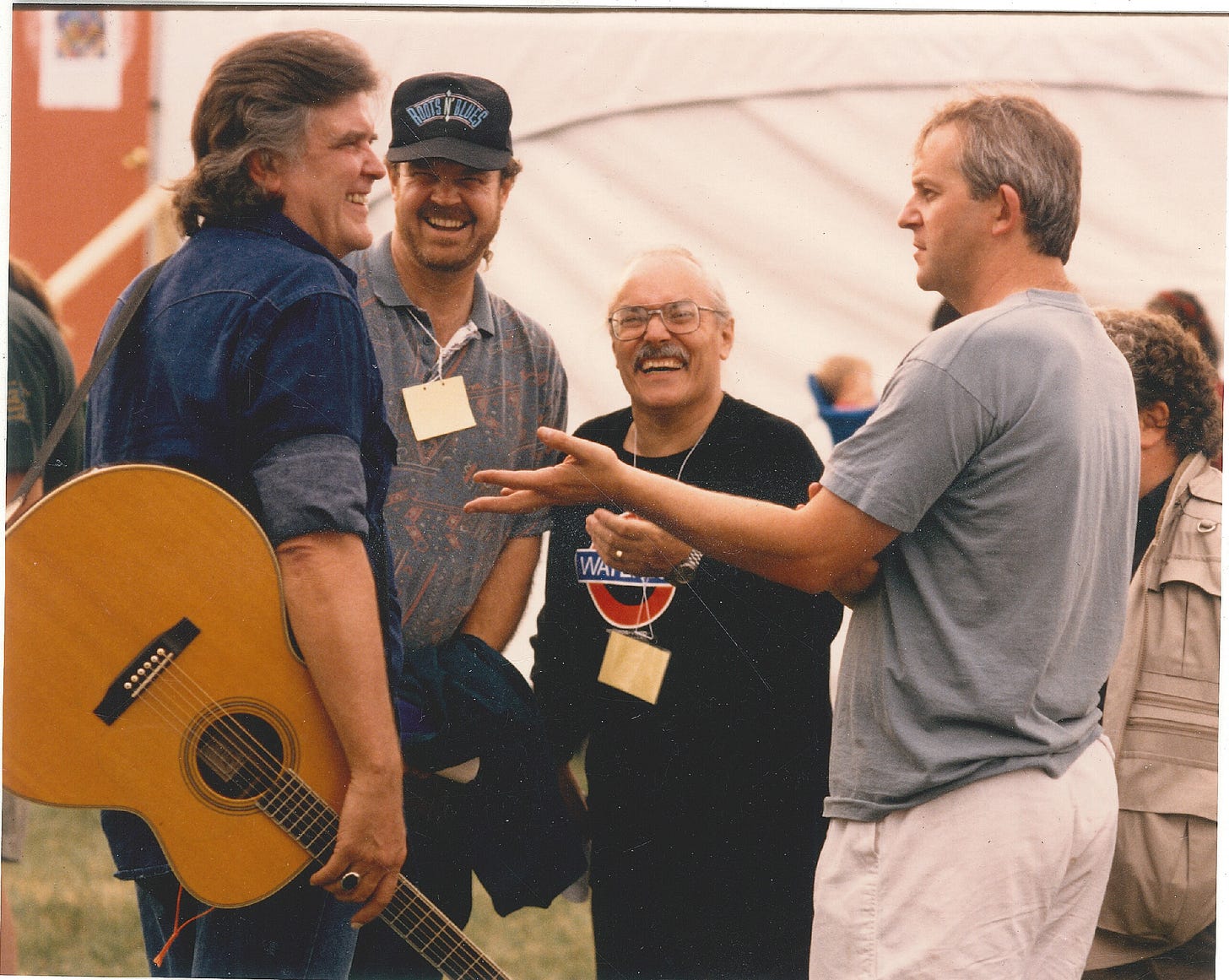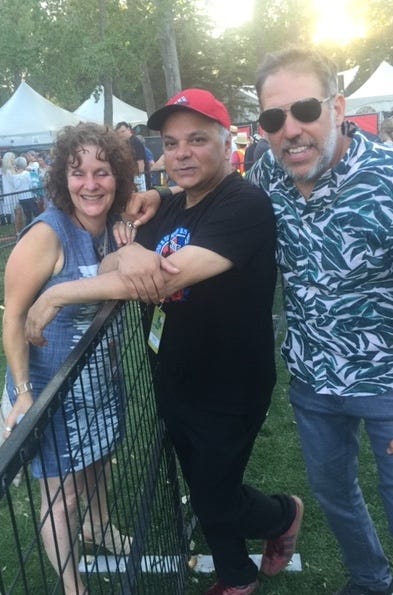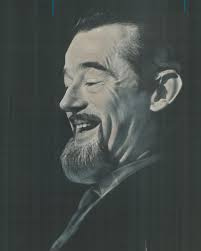#11 Stories from the Edge of Music: Folk festivals pt 2
How to get booked, or not, at a folk festival
This music biz veteran has been telling these stories every week for well over two months now. And the most popular ones have been about the Greek pop singer Nana Mouskouri, jazz trumpeter Miles Davis — and some ruminations about folk festivals. After all, this writer has been to more than 200 festivals so he insists he knows what he’s talking about…

IT’S MID-NOVEMBER, AND THE BIRTH OF NEXT SUMMER’S FESTIVALS IS ALREADY TAKING PLACE
The men and women — the “artistic directors” — who book and programme the 2024 events are hard at work. In two or three months, the gods willing, they will have finished almost all of their line-ups, booked the headliners, paid the deposits on the artists’ fees, and by March they’ll be figuring out how to finalize the programming for the daytime “workshops” and the evening concerts.
It’s not an easy job. There are literally thousands of artists to choose from — and every day the email inbox is full of “applications” from lesser-known (or totally unknown) artists, full of links to websites and videos. Snail mail brings a small deluge of CDs, old-school press kits and begging letters.
Almost every artist, known or unknown, is aware that successful festival appearances can be a major boost to a career — suddenly an artist can be playing to thousands of people instead of audiences in clubs or even concert halls. Festivals are the places where newcomers can establish major careers; ask Bob Dylan, Emmylou Harris, Joan Baez, Jackson Browne or relative newcomers like Brandi Carlile. In Canadian terms, Joni Mitchell, Gordon Lightfoot, Allison Russell and hundreds more came up through the festival circuit… even Arcade Fire and Feist reached Ontario audiences by early appearances at Guelph’s renowned Hillside Festival.
If you go to summer festivals, you might care to know how the artists you’ll get to hear got chosen. It’s not an easy process — and for many (no, most) artistic directors it starts with ignoring all the unsolicited requests from unknown artists.
It’s a jigsaw puzzle with hundreds of pieces

ADs have, at the beginning of the process, a wish list of who they’d like to have. If you are a totally unknown artist with little or no profile, and you’ve applied with great hopes and expectations, you are not on any festival’s wish list. Save yourself the effort.
Probably the first names on that wish list will be major “headliners” — artists they’d tried to get last year but couldn’t, and maybe some local people who were promised appearances in the past. Early calls, made as far as a year in advance, to agents, managers and (in a few cases) the artists themselves, all may yield positive results.
Then comes a whole raft of other considerations. In no order whatsoever, are an equal number of male and female performers being chosen? Are there artists from Black, First Nations, gay and trans communities? Are there brand new and even unknown artists? What about veterans from folk’s storied past? And how about artists for children? What’s the percentage of Canadian artists? Are there performers from other countries outside of Canada and the U.S.?
Finally, are the artists being hired a draw with the potential audience?
Yes, I’ve noticed — we’ve not even talked about the musical part of it all! So, are there proportionate numbers of artists representing the various genres under the “folk” umbrella? And that includes (at a minimum) singer-songwriters, bluegrass groups, “Americana” artists, blues players or bands, “world” music performers, “alternative” artists, “country” performers — and those who just can’t be put into neat descriptive boxes.
And what about thinking outside the box? How about a spoken-word element, like the Calgary Folk Festival’s Talk Tent? Or what about some old-school jazz? Or a couple of rootsy pop bands — Hillside and Calgary do this, and so does Mariposa…
There are even more factors. There’s a board of directors to consider. There’s the budget. There are rising costs of just about everything that affects the budget — from portable toilets to the production costs of the riders that headliners add to their contracts.
The AD is the de facto spokesperson for the festival itself. He or she will be interviewed about every aspect of the event; they need media skills, too.
Everyone in any festival organization — from the president of the board to the volunteer in charge of the parking lot — thinks they could be the AD, and would do a better job. The AD of any festival will be bombarded with suggestions, criticism and occasionally sheer anger from artists not chosen.
It’s no bed of roses — and what’s the reward? The rule of thumb is that the AD should be paid 10 per cent of the artistic budget, which ranges from $10,000 to $25,000 for small festivals and between $500,000 to $750,000 for the handful of major events.
Not a job I want to do. Been there, done that, back in the day. Made mistakes, put together good programmes, helped launch some careers. And look back with great memories and occasional embarrassment.
+++++++++++++++++++++++++++++++++++++
Advice to newcomers who want to perform at a festival
• Have an extensive online presence, a pertinent website, a new recording, some minimal radio play and a performance video.
• Take part in showcases at folk conventions. Be different. Be visible.
• Volunteer at a festival near you.
• Ask friends and fellow performers who know ADs to recommend you.
• Establish personal relationships with festival ADs.
• Don’t be pushy.
+++++++++++++++++++++++++++++++++++++
THIS VETERAN FOLK SINGER REALLY WAS AN EGREGIOUS OLD FART
At every festival there are artists who need extra attention, maybe because of their temperament, their fame, their age or their physical limitations. And some artists are simply difficult.
One of the latter was the Halifax-based balladeer Ed McCurdy, who played the very first Mariposa festival in 1961, and returned three decades later to mark the festival’s 30th anniversary.
After a series of fairly inconsequential demands, I muttered to a colleague that McCurdy was an “egregious old fart.” Alas, my grumpy comment got back to him.
He faced me down. “Young man, I understand that you’ve been calling me an egregious old fart.” Blushing, I apologized, stammering about my stress levels and…
He cut me off. “No, no, young man. I like the description. I AM an egregious old fart…”
+++++++++++++++++++++++++++++++++++++
QUOTE OF THE WEEK
“When I walk down the hall at a folk convention, I feel as though I have a target on my back.” — Terry Wickham, AD of the Edmonton Folk Music Festival.
+++++++++++++++++++++++++++++++++++++
SOME VIDEO LINKS TO CARRY YOU THROUGH THE WEEKEND
Allison Russell @ Mariposa
A glimpse of the Calgary Folk Music Festival
Serena Ryder @ Mariposa
+++++++++++++++++++++++++++++++++++++
WHAT STORIES FROM THE EDGE OF MUSIC CAN YOU EXPECT NEXT?
Next week: Some behind-the-scenes stories about Ray Charles. After that, check in for tales about Monty Python’s Eric Idle, independent artist and self-styled “baby dyke” Ani DiFranco, fifth Beatle George Martin and guitar genius Jeff Healey. And more. Still more. Maybe you should support all this with a modest paid subscription?





Another banger, Richard! I bet most emerging artists have never really thought about the whole selection process of music festivals and how it all unfolds. I know Patrick and I had no idea when you booked Bare Bones. It felt like winning the lottery. Still does thirty years later...
Looking forward to reading more!!!